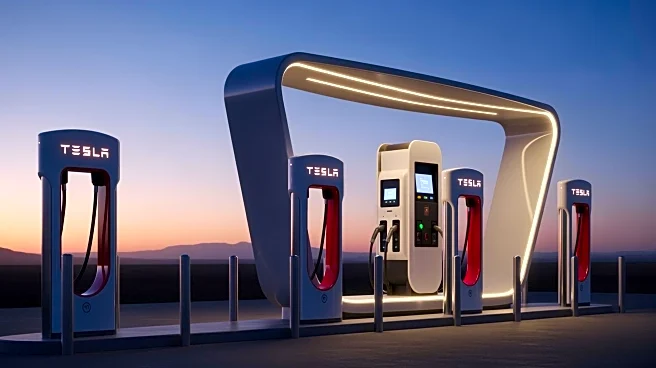What's Happening?
Tesla has reported a record number of vehicle deliveries in the third quarter of 2025, totaling 497,099 units, which marks a 7.4% increase year-over-year. This surge in deliveries was largely driven by U.S. buyers rushing to take advantage of the expiring
$7,500 electric vehicle tax credit. Despite the impressive delivery numbers, Tesla's financial results revealed a squeeze on profit margins due to higher costs and significant price cuts. The company's revenue for the quarter reached approximately $28.1 billion, surpassing forecasts, but the adjusted earnings per share fell short of expectations at $0.50 compared to the anticipated $0.54. Tesla also introduced lower-cost 'Standard Range' versions of its Model Y and Model 3, which disappointed investors due to modest price reductions.
Why It's Important?
The record deliveries highlight Tesla's strong market presence and consumer demand, particularly in the U.S. However, the profit margin squeeze raises concerns about the sustainability of Tesla's aggressive pricing strategy and its impact on long-term profitability. The introduction of lower-cost models is a strategic move to capture a broader market segment, but the lukewarm investor response suggests skepticism about its effectiveness. The expiration of the U.S. tax credit could lead to a decline in demand, affecting Tesla's sales momentum. Additionally, the company's high valuation and ambitious growth targets, including Elon Musk's proposed compensation plan tied to a $8.5 trillion market cap, are under scrutiny, with proxy advisers recommending rejection of the plan.
What's Next?
Tesla faces several challenges moving forward, including maintaining delivery volumes without the tax credit boost and addressing margin pressures. The company plans to ramp up production of its lower-cost models, aiming to achieve a sub-$30,000 mass-market electric vehicle. Shareholders are set to vote on Musk's compensation plan, which could influence investor sentiment and governance practices. Analysts are divided on Tesla's future prospects, with some bullish on its autonomous and AI potential, while others caution against its high market valuation. The competitive landscape is intensifying, with rivals like BYD gaining ground in key markets, posing a threat to Tesla's market share.
Beyond the Headlines
Tesla's situation underscores broader trends in the electric vehicle industry, including the impact of government incentives on consumer behavior and the growing competition from international and legacy automakers. The company's focus on AI and autonomous driving technologies reflects a shift towards viewing Tesla as a tech company rather than solely an automaker. This transition could redefine its market positioning and influence investor expectations. The ethical and governance implications of Musk's compensation plan also highlight the challenges of balancing visionary leadership with responsible corporate practices.

















